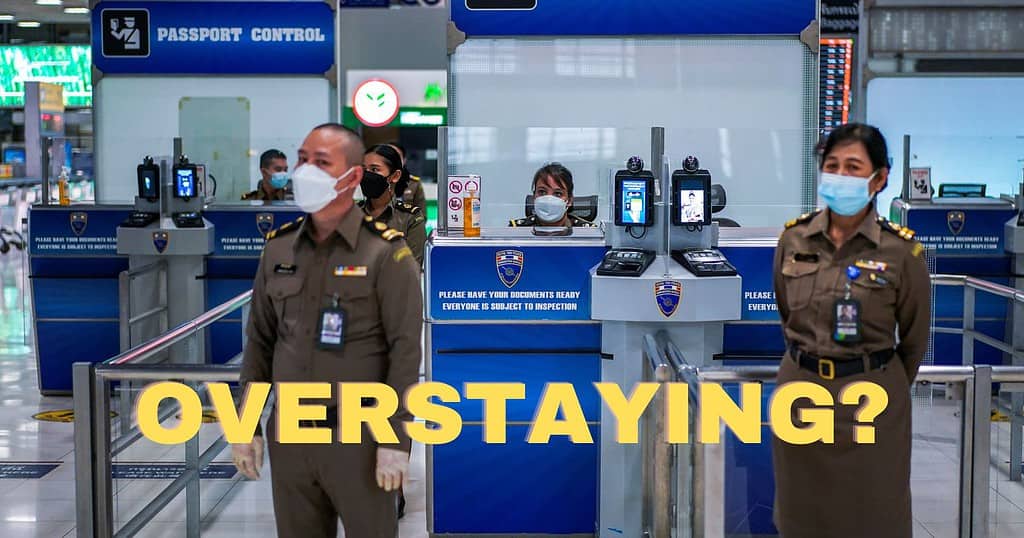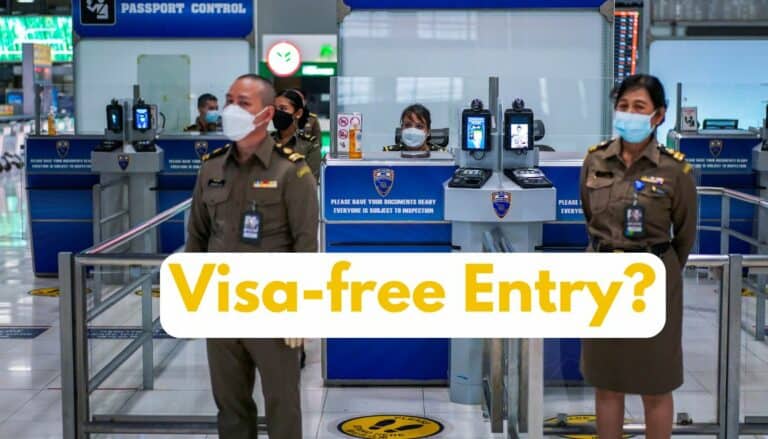Overstay in Thailand: Don’t Turn Your Holiday Into a Nightmare
As a Thailand lover myself, I participate in quite a few Thailand Facebook groups. Unfortunately, I see quite often that people travel to this country and miscalculate on the number of days that they’re staying.
This is called overstaying and it does come with a number of consequences, so in this article, I’m going to share everything there’s to know about overstay in Thailand.
From what exactly it means, to the legal consequences that come with it and what to do if you find out that your flight leaves a couple of days too late

What Is Overstay In Thailand And What Are The Consequences
Overstaying your visa in Thailand is a serious offense that can come with some harsh and long-term consequences if you get caught. Overstaying means exceeding the allowed length of stay on either tourist, non-immigrant, business, or student visas.
As well as entering without proper authorization or documentation. In this case, one will be considered to be illegally living in Thailand which may result in criminal charges such as fines, imprisonment, and even deportation. So it’s essential not to overstay!
If you’d like to know how long you can stay in Thailand without a tourist visa, check out this article that I wrote about it.
Additionally, if you don’t abide by Thai immigration laws and stay in the country without proper documentation or after your visa has expired, then be prepared to face consequences. For instance, on top of a possible hefty fine and jail time ranging up to 5 years depending on how long you have been staying there illegally, as well as any previous offenses with Thailand authorities that may come into play, re-entering the country could also be out of reach for some period of time (up to five years) imposed at will by Thai officials.
Are you sure it’s worth risking all these issues just because visas are complicated?
If you’ve accidentally overstayed your visa in Thailand due to unexpected events like a flight delay or medical emergency, there’s no need to worry, help is available.
There are steps that can be taken which will get you back into compliance with Thai immigration law and allow re-entry without fear of legal action being taken against you.
One way of addressing an overstay situation is through Voluntary Departure which allows someone who has stayed beyond their visa period (at least 90 days) to leave voluntarily without facing criminal charges or a ban on entry for up five years – provided they depart within 30 days after receiving notice of outstaying their permit. If leaving right away isn’t feasible, applicants can apply with local Immigration offices in order to get an additional 30-day extension before legally departing from the country.
Keep in mind though that when you’ve overstayed for a longer period of time, you might get an overstay stamp on passport. And if it gets to the extreme, you might even get on the Thailand overstay blacklist, which can become a hassle anytime you’re trying to get back into Thailand in the future.
How Long Can You Overstay In Thailand Without Repercussions
Visiting Thailand can be an incredible experience. From its fantastic jungles to the stunning beaches, it truly has something for everyone. But if you’re planning a visit, there’s one thing that you’ll want to make sure of: don’t overstay your visa!
Depending on what kind of visa you have, this could land you in some serious trouble with immigration authorities, so how long are they really allowing you to stay?
Most tourists who come here just for vacation or business purposes will typically receive a visa exemption that is good for up to thirty days. Obviously exceeding those limits without permission is not recommended at all and consequences might be applied.
If you’re planning to stay in Thailand for more than 30 days, it’s crucial that you apply for a tourist visa which will be valid for 60 days, before your current visa expires. Otherwise, be ready to face fines and potential deportation when the time comes.
Not a great way to end your holiday!
In some cases, those who come as students or workers are fortunate enough to receive visas granting them up to 12 months, depending on their job type plus age and nationality specifics. although this is still subject to approval by Thai authorities.
It’s essential for you to be aware that it is never a good idea to overstay your visa.
Even if nothing happens right away, there could be repercussions in the long run like being denied entry back into Thailand later on due to having an expired visa status registered with immigration authorities.
Those who plan on staying more than 30 days should always make sure they have all of their documentation completed before (or immediately upon) arriving. This includes filling out forms accurately when applying for, or renewing existing visas as well as making certain your records concerning those applications stay current during your time in Thailand so you don’t encounter any problems down the line!
For most visas, renewal must take place yearly if one wishes to stay longer than 12 months here, failing which fines and/or deportation can occur once leaving Thai soil. Anybody traveling without understanding these points may end up only regretting it further ahead.
How Much Is The Fine If You Overstay In Thailand
If you are planning to travel to Thailand and have an expired visa, it is essential for you to know what happens if you stay longer than your permit allows. The Thai government has firm guidelines concerning an overstay in Thailand, so being informed of the consequences connected with this action is key before going there.
According to the Thai Embassy, the fines are as follows
| Overstay duration | Fine |
| Less than 90 days | 500 baht per day (up to a maximum of 40.000 baht |
| More than 90 days | 20.000 baht fine and 1-year ban from entering Thailand |
| More than 1 year | 20.000 baht fine and 3-year ban from entering Thailand |
| More than 3 years | 20.000 baht fine and a 5-year ban from entering Thailand |
| More than 5 years | 20.000 baht fine and a 10-year ban from entering Thailand |
Meaning if one spends just one week beyond their set time limit, they could owe 3500 baht ($105 USD), or even more depending upon days actually spent without legal permission!
Interestingly enough, one major repercussion related to staying beyond your authorized time frame can be fines imposed by immigration officials. So basically if you plan on visiting Thailand make sure that whatever duration of stay was specified on your visa won’t be exceeded!
If you’re traveling to Thailand, either temporarily or permanently, it’s really important that you understand what paperwork is needed and take the steps necessary to make sure your visas and passports are kept up-to-date.
Your passport needs to be valid for at least 6 months from the time you enter the country.
Failure to follow regulations can result in hefty fines plus other penalties such as deportation from Thailand at your own expense if found guilty of illegal stay.
Not only this but any unpaid fines associated with an individual’s illegal overstay will be added on top of anything else related to traveling into the country until they’ve been paid off completely!
Where And How To Pay The Fine For Overstaying in Thailand at the Airport
Departing Thailand after the visa expiration isn’t challenging if you make some preparations ahead of time. Nevertheless, it’s worth mentioning that when departing from Thailand and having overstayed your visa – you will have to pay a penalty fee of 500 – 20,000 baht depending on how long it has been exceeded. Fortunately, dealing with this fine won’t be too complicated or difficult either!
You’ve got a fine in Thailand and aren’t sure how to pay it?
There are three main ways you can do this: cash (Thai baht only), credit card, or debit card.
You’ll find that the process is very similar no matter which airport you’re departing from.
Just look for the payment center! Cash payments may be made at any Thai airport when leaving and usually involve queuing up at an appropriate desk/window with your ID before getting given directions on what needs to be done next.
Credit cards / Debit Cards will also work but depending on where exactly you are paying, make sure to double check if they accept your particular type of Card as some places might not take certain ones like AmEx, etc… Finally, once everything has gone through successfully all that’s left is simply waiting until boarding time begins!
If you are planning to pay with cash, first locate the Airport Immigration Office at your departure airport and look for their “Overstay Counter”. There they will assess how much money is owed due to your particular case of overstaying in Thailand and give an official receipt. Be sure that you keep this slip as evidence that all fines have been paid before leaving Thai borders since it can be helpful later on if ever there are any issues regarding your immigration status in Thailand going forward. It’s important not to forget about keeping proof!
If you don’t want to pay with cash, no worries.
Most airports in Thailand have machines that accept both credit and debit cards for fines-related matters when you are leaving the country as well as entering it again during future trips if need be.
Be sure to keep all receipts provided by these machines since they act as evidence of your payment prior to exiting Thai borders just like at the Airport Immigration Office mentioned before.
So this advice should always be kept in mind regardless of which method you opt for eventually when settling up such fines afterward whenever possible.
Thai Law and Its Implications on Overstaying
Entering Thailand on a tourist visa carries significant legal responsibilities.
As the laws state that if you don’t leave before your visa expires, then hefty fines, possible imprisonment, and even deportation can come into play. What do you do when this has happened to you? Well, there are several options available for those who have already overstayed their time in Thailand; giving them an opportunity to get back into compliance with Thai law.
If you’re overstaying for a longer period of time and you’re worried about going to the immigration office, don’t be!
Find yourself a nearby immigration office and explain your situation. And yes, although there are consequences, it’s better to face them than to be stopped by the police for a routine check and be arrested for overstaying.
To sum it up, overstaying in Thailand can have severe repercussions such as fines, imprisonment, and a ban from entering the country. Thus, before traveling to Thailand you should be aware of these Thai immigration rules and laws. If you require assistance with visa applications or just need information about immigration regulations, get in touch with an authorized Thai attorney or specialist dealing with these types of legal matters. They will definitely help!
And when booking your ticket, just play it safe. Personally, I usually have 4 weeks’ holiday from work and I make sure to go for about 28 days.
This way, I still have a couple of days to unpack when I get back home and I know for sure that I’m not overstaying.






